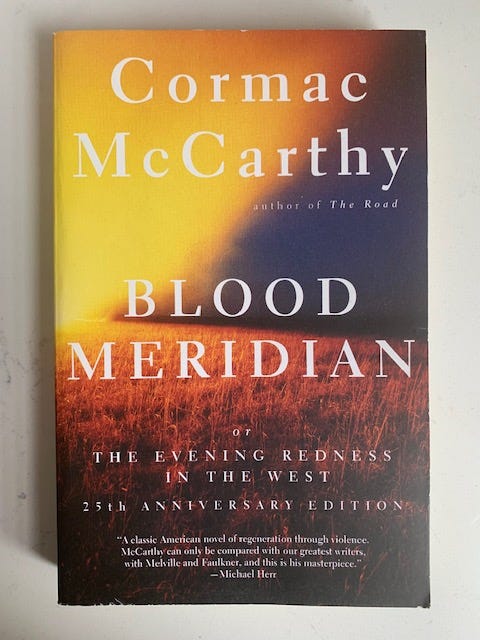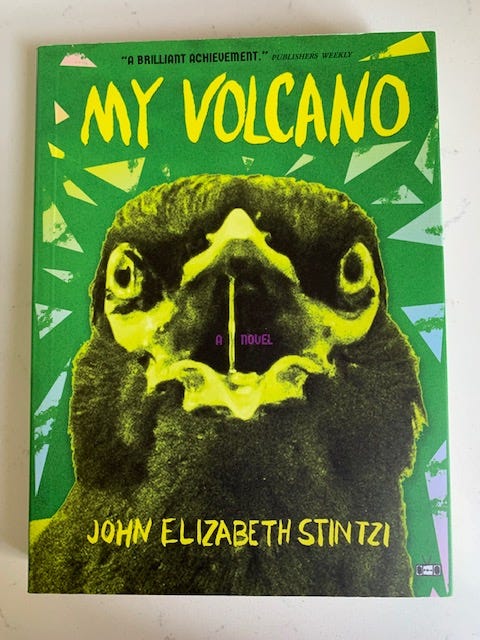'Blood Meridian or The Evening Redness in the West' by Cormac McCarthy
'What joins men together, he said, is not the sharing of bread but the sharing of enemies.'—Review #191
The new ‘Predator’ movie is exciting and good, and it poses an interesting question that relates to this week’s book as its heroine, a young Comanche woman named Naru, tangles with extraterrestrial and colonial threats: Who’s more monstrous? An invader from outer space, or one from across the ocean? Here is Naru, portrayed by Amber Midthunder:

The movie, called ‘Prey,’ was recently released on Hulu, and I watched it between chapters of Cormac McCarthy’s novel ‘Blood Meridian or The Evening Redness in the West.’ Both are set centuries ago and depict native people being hunted by enemies with superior firepower. The book affirms that men are the more frightening and murderous creatures.
Here’s the cover:

‘Blood Meridian’ follows ‘the Kid,’ a teenage Tennesseean runaway who ends up in Mexico among mercenaries contracted by local governments to stalk, murder and scalp the Apache. (They are paid by the scalp.) But the real protagonist is violence—dark, brutal and irredeemable behavior that would embarrass a cold-blooded killer alien. (Even Predators have a code!) Everywhere the marauders go, death follows. I love this description of it:
The dust the party raised was quickly dispersed and lost in the immensity of that landscape and there was no dust other for the pale sutler who pursued them drives unseen and his lean horse and his lean cart leave no track upon such ground or any ground. By a thousand fires in the iron blue dusk he keeps his commissary and he’s a wry and grinning tradesman good to follow every campaign or hound men from their holes in just those whited regions where they’ve gone to hide from God.
That last part had me like:

God’s attention is certainly elsewhere as the killers—including an ex-priest, a black man and several members of the Delaware tribe, among others (to show that all men are capable of evil)—slay men, women, children and animals indiscriminately. The group has a leader called, ironically, the Judge. He’s physically imposing, completely hairless, often naked and a total psycho. He’s also a philosopher, opining that man’s natural and perfect state is in a war of all against all. ‘War is god,’ he says. Given his talent for murder and his ability to charm foes and evade threats, one may be tempted to think he’s right. But I don’t think McCarthy’s aim is to glorify his nihilism (or the racism, immorality and ignorance that drives his followers), but to shock the reader with how terrible it is, like:

Perhaps, then, amid the blood and the gore, ‘Blood Meridian’ is a morality tale, warning us that a world without law, love and solidarity is a hellscape. McCarthy conjures it with a style that is spartan, elegant and breathtaking. Please indulge another excerpt:
All night sheetlightning quaked sourceless to the west beyond the midnight thunderheads, making a bluish day of the distant desert, the mountains on the sudden skyline stark and black and livid like a land of some other order out there whose true geology was not stone but fear.
Again, I’m like:

Despite dropping quotation marks and some apostrophes, and using some words that I had to look up, I galloped through the pages. Several of McCarthy’s books have been adapted to film such as ‘The Road,’ which I’ve reviewed, and ‘No Country for Old Men.’ Apparently, adapting ‘Blood Meridian’ has been fraught. I’m totally OK with it never happening. It would be a tough watch, and I don’t think I want to return to this world. I’ll take ‘Prey 2’ instead.
How it begins:
See the child. He is pale and thin, he wears a thin and ragged linen shirt. He stokes the scullery fire. Outside lie dark turned fields with rags of snow and darker woods beyond that harbor yet a few last wolves. His folk are known for hewers of wood and drawers of water but in truth his father has been a schoolmaster. He lies in drink, he quotes from poets whose names are now lost. The boy crouches by the fire and watches him.
Night of your birth. Thirty-three. The Leonids they were called. God how the stars did fall. I looked for blackness, holes in the heavens. The Dipper stove.
The mother dead these fourteen years did incubate in her own bosom the creature who would carry her off. The father never speaks her name, the child does not know it. He has a sister in this world that he will not see again. He watches, pale and unwashed. He can neither read nor write and in him broods already a taste for mindless violence. All history present in that visage, the child the father of the man.
My rating:
‘Blood Meridian or The Evening Redness in the West’ by Cormac McCarthy was published by Random House in 1986 and by Vintage Books in 1992. 351 pages. $15.81 at Bookshop.org.
What’s next:
Before you go:
ICYMI: Review #190
See these: Books on GIF was featured in two great book newsletters this week. First, we contributed a recommendation of ‘Transit of Venus’ by Shirley Hazzard to last Monday’s edition of What to Read If:
And on Friday, Book Notes featured a preview of today’s BoG newsletter:
Book Notes has a new feature I love highlighting books people were seen reading on New York City subways. Be sure to subscribe to both newsletters. They’re terrific!
Thanks for reading, and thanks especially to Donna for editing this newsletter!
Until next time,

MPV











Cormac McCarthy undoes me. His writing and storytelling are like no other but the darkness of his people and his stories haunt me. I guess that's a good thing.
I had just finished your excellent review and my son was emptying a bookshelf to take more of his books to his apartment. BLOOD MERIDIAN was in the middle and I mentioned your review. He has tried it twice and found it too bleak. “Not for you, Lois” he told me and took it to give it one more shot. Have a great week, Kate